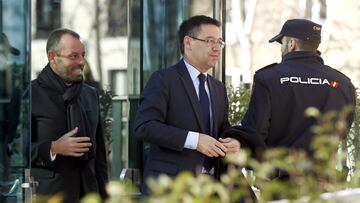What action did Real Madrid take on the Negreira case and Barcelona?
After the emergency meeting of its Board of Directors, the club decided to get involved in the Negreira case if the complaint from the Prosecutor’s Office is admitted for processing.

This Sunday morning Real Madrid had an emergency meeting with its Board of Directors. The meeting resulted in the request from Real Madrid to appear in person in the trial that can be opened against Barcelona in the Negreira case. The case is being handled in the Court of Instruction, number 1 of the city, after the complaint by the Prosecutor’s Office. The decision was made due to the seriousness of the facts after the formal complaint by the Prosecutor’s Office, who sees clear indications that “actions were carried out to favor the FCB in the decision-making of the referees in the matches played by the club, and thus in the results of the competitions.” Los Blancos had preferred to stay on the sidelines to let the Prosecutor’s office act, choosing not to adhere to the statement made by the First and Second division clubs. If Madrid is admitted in the process, they will have access to all the documentation that is used in the trial.
🚨⚪️ OFFICIAL: Real Madrid have decided they will appear in the proceedings of the Barça - Negreira case. pic.twitter.com/3BBzl6bejA
— Madrid Xtra (@MadridXtra) March 12, 2023
Real Madrid thus became the first club to ask for access to the case against Barcelona, right after the Prosecutor’s Office formalized its complaint. The Public Ministry accuses the Catalan club as a legal person, and former presidents Sandro Rosell and Josep Maria Bartomeu of a continuous crime of corruption in business in the form of sports fraud. Both former presidents are also charged with the crime of business fraud and (in the matter of Bartomeu) with a third crime of falsifying a commercial document. Two former club executives, Albert Soler, and Óscar Grau, are also accused.
Official Announcement. #RealMadrid
— Real Madrid C.F. 🇬🇧🇺🇸 (@realmadriden) March 12, 2023
According to the Prosecutor’s complaint, Barcelona, through its former presidents Sandro Rosell and Josep Maria Bartomeu, a “strictly confidential verbal agreement” was reached, with Enríquez Negreira, “so that, in his capacity as Vice President of the CTA and in exchange for money, he could carry out actions tending to favor the FCB in the decision-making of the referees, in the matches played by the club, and thus in the results of the competitions. Referees whose designation for each match of the official Spanish competitions, at the state and professional level, was carried out by the CTA, the body in charge. In addition, the evaluation of the referees, which the defendant participated directly in the promotions and demotions of category of such, as well as the proposal of candidates for international destinations.””
What does the prosecutor say about Barcelona and Negreira?
Related stories

Casemiro sent off again

Real Madrid’s possible shirt for 2023-24
The investigation alleges that from 2001 to 2018, Barcelona paid a total of 7.3 million euros to Negreira, who during all those years was number 2 on the Technical Committee of Referees. It did so through two companies owned by Negreira, Nilsat, and Dasnil, although it has also subsequently been proven, for the Prosecutor’s Office, that the invoices presented do not respond “to any provision or real technical advisory services.” However, Negreira stated that he provided “verbal advice” to the club. Originally, a tax inspection by the Ministry of Finance brought to light Barça’s payments to Negreira. Barcelona was then required to provide a “copy of the videos, documents or reports in which the specific advisory work was carried out. The FCB’s response was that the required documentation had not been found”.
The complaint is directed against Barcelona as a legal entity and also against five natural persons: former referee Negreira, former presidents Rosell and Bartomeu, former executive director Óscar Grau and former sports director Albert Soler. In the case of Barça, the Sports Law indicates that sports sanctions prescribe three years after the irregularity was committed. However, the penal code opens the door to sanctions of loss of category or the entity’s dissolution in extreme or severe cases. In addition, possible sanctions that UEFA can establish if Barça is proven guilty, including the exclusion for a season from any European competition.